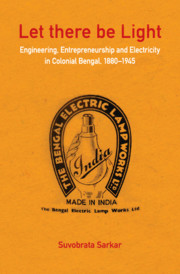Book contents
- Frontmatter
- Contents
- List of Figures
- Preface
- Acknowledgements
- List of Abbreviations
- Introduction
- 1 Technical Knowledge and Its Institutes
- 2 Entrepreneurship, Industry and Technology
- 3 Electrification: The Shaping of a Technology
- 4 Domesticating Electricity
- 5 Assimilation of Technological Ideas
- Conclusion
- Bibliography
- Index
Introduction
Published online by Cambridge University Press: 30 April 2020
- Frontmatter
- Contents
- List of Figures
- Preface
- Acknowledgements
- List of Abbreviations
- Introduction
- 1 Technical Knowledge and Its Institutes
- 2 Entrepreneurship, Industry and Technology
- 3 Electrification: The Shaping of a Technology
- 4 Domesticating Electricity
- 5 Assimilation of Technological Ideas
- Conclusion
- Bibliography
- Index
Summary
Perhaps, it is too early yet to judge of the results of a movement which began in right earnest not more than a decade ago. But I am constrained to sound a note of warning and to try to dispel an illusion, more, because of the share, however, humble, I have had in the Technical Education movement, and because, I confess, I have been under the illusion myself. The illusion is, that with the progress of technical education and with persistent endeavour, India will gradually become studded with factories after the manner of the flourishing countries of Europe owned and managed by Indians.
—P. N. Bose, the noted geologist and science enthusiast, in 1916Many consider an electrification is luxury even today. But this is not true. We know the electrification leads to rapid industrialization. The recent industrial growth of our country creates huge demand for continuous power supply. Use of the diesel engine is economical compared to the steam engine on several reasons. To fulfil the huge industrial demand, we need plenty of such engines for power supply without an interruption. How long we will depend on the foreign counties for supply of these engines? Or shall we try to manufacture such engines in our country itself?
—Jatindranath Basu, Professor at the Bengal Technical Institute (1928)Recent scholarship has recognized well the significance of technology in understanding the history of modern India. During the second half of the twentieth century, the ‘colonial world’ became a prominent research focus for historians, and the history of modern technology is written in the backdrop of the empire. The history of technology on the subcontinent thus framed narrates a general story about the character of empire and the other forces that shaped this history up until independence in 1947. But today historians of technology share an interest in the history of knowledge, the relation between the global and the local, and the role played by experts and know-how. As Karel Davids rightly observes, ‘software’ has become as crucial as ‘hardware’ for technology's storytellers; information techniques are as important as instruments and machines.
Today, most industrialized states in the world attempt to secure the most effective utilization of their respective knowledge base.
- Type
- Chapter
- Information
- Let there be LightEngineering, Entrepreneurship and Electricity in Colonial Bengal, 1880–1945, pp. 1 - 28Publisher: Cambridge University PressPrint publication year: 2020



